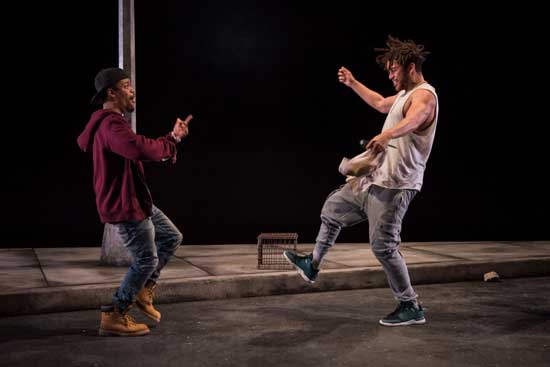
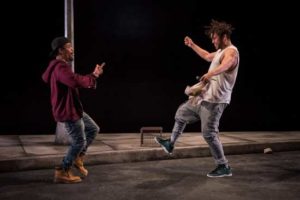 [rating=3] Another World Premiere in Chicago! Wow! It’s about time that the world recognized that Chicago is indeed THE “theater city”. Tonight, I joined an almost full house for a riveting new piece entitled “Pass Over”. No, this is not an eight- day holiday where you eat matzoh and Matza Ball soup. This is a different angle on a classic play, “Waiting For Godot” as seen through the eyes of playwright Antoinette Nwandu. When one walks into the “upstairs” black box at Steppenwolf, one sees two African-American men on a sort of bare stage. There is only a street lamp, a broken bathroom sink (on the floor), a deflated basketball, a metal pail and a metal container. The men are Kitch (a very powerful performance by Julian Parker) and Moses (deftly handled by Jon Michael Hill). They are street-guys, homeless stuck in a vicious circle of life. They have nothing and nowhere to go. Their lives are day-to-day and their dream is to “Pass Over” to the other side, although until midway through the script, they are not sure of what the “other side” might be.
[rating=3] Another World Premiere in Chicago! Wow! It’s about time that the world recognized that Chicago is indeed THE “theater city”. Tonight, I joined an almost full house for a riveting new piece entitled “Pass Over”. No, this is not an eight- day holiday where you eat matzoh and Matza Ball soup. This is a different angle on a classic play, “Waiting For Godot” as seen through the eyes of playwright Antoinette Nwandu. When one walks into the “upstairs” black box at Steppenwolf, one sees two African-American men on a sort of bare stage. There is only a street lamp, a broken bathroom sink (on the floor), a deflated basketball, a metal pail and a metal container. The men are Kitch (a very powerful performance by Julian Parker) and Moses (deftly handled by Jon Michael Hill). They are street-guys, homeless stuck in a vicious circle of life. They have nothing and nowhere to go. Their lives are day-to-day and their dream is to “Pass Over” to the other side, although until midway through the script, they are not sure of what the “other side” might be.
As they dream about what they could have when that day comes, they talk trash talk to each other and the use of the “N-word” seems over-used, until there appears a stranger, bearing a basket filled with food such as these two men could only dream of. This man is White, and dressed in white from head to toe( well, okay, his shoes are light brown) and his name is Master (Ryan Hallahan, underplays this role to perfection). The conversation between the three men is tough, as the two “brothers” do not know what to make of this white person in this dangerous street where every night the Po-Po (slang for police) come out and shoot Negroes (only they call them the” N-word”).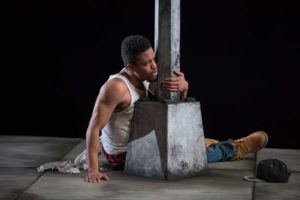
Sharply directed by Danya Taymor (in fact, almost choreographed) we can get into it quickly. When the audience enters the theater, the two men are on the stage already. Moses is sleeping and Kitch is kind of dancing around, talking to himself, reliving some type of experience. There is amazing music playing (show-tumes that will ring familiar to each audience member) and the original music composed for the show by Ray Nardelli, who also does the sound, will add to your enjoyment. The lighting (Marcus Doshi) allows us to see the days turn to night and of greater importance, the nights become days (making it through each night, alive, is an achievement for these men). Again, the set (Wilson Chin) is very simple as are the costumes (Dede Ayite) and the props (an amazing array of food in the picnic basket) could whet your appetite.
There is one more character, the policeman known as “Ossifer” (played by Ryan Hallahan, who will in no way remind you of his other character). I do not want to get into the depth and breadth of this powerful story but will tell you that the inspiration for Nwandu to author this play was to stress the importance of “black lives”. We read and hear as well as see that this is a fear for many young people in our world. What happens to the young black men who are not sports heroes, entertainers , business owners or Church leaders? The heart of this story is that young black men who are not of great importance to the world become even less important to their community. The ending of this play will surprise and possibly shock you. In fact, when the play ended (80 solid minutes, no intermission) the audience was stunned and it took 10-15 seconds for them to begin applauding this wonderful cast.
As I said earlier, this concept is based on Beckett’s “Waiting For Godot” in which two men are in the park, waiting for this mysterious character who is bound to change their lives and destiny. He never shows, although some others do, but it is their relationship that we learn from, as do they. In this story, these two men who are close for one reason, find more in their need for the other, based on what happens during the 80 minutes of action. If you love “Godot” you will find this story comparable. If you did not like “Godot”, but are open to the content of what the story is telling us about our modern world, you will at least benefit from the story line and the characters presented. What may bother you is the language, but to be honest, this is what we hear everywhere in today’s world. Let’s face it. This is not your Parent’s America anymore!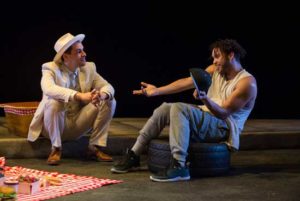
FYI- There is a place in the story where the two men agree that getting out of the neighborhood and to a better place, might be not escaping, but instead, death. The dialogue here is about “Pass Over” meaning something different from the earlier description. What Nwandu has written is meant to make us think and to challenge those of us who are in a better place to not ask young Black men to prove their value, but rather for White America to judge them for who they are instead of what they are (or what they appear to be).
“Pass Over” will continue at Steppenwolf Theater located at 1650 N. Halsted Street (upstairs stage) thru July 9th with performances as follows:
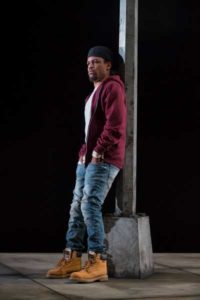 Tuesdays 7:30 p.m. (no performance on July 4th)
Tuesdays 7:30 p.m. (no performance on July 4th)
Wednesdays 7:30 p.m.
Thursdays 7:30 p.m.
Fridays 7:30 p.m.
Saturdays 3 p.m. and 7:30 p.m.
Sundays 3 p.m.
Tickets range from $20-$89 and can be ordered by calling 312-335-1650, online at http://www.steppenwolf.orgor visiting the box office.
Accessible performances are:
6/23 ASL (American Sign Language) 7:30 p.m.
6/24 Open Caption 3 p.m.
6/25 Touch Tour, audio described at 1″30 p.m. performance at 3 p.m.
Following every Sunday performance, there is a discussion panel with scholars, journalists, activists, community leaders and artists. NO EXTRA CHARGE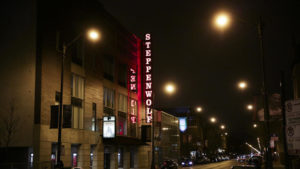
Parking in the area is not that difficult, but there is valet parking at the theater and of course, the Steppenwolf has a parking garage just south of the theater building. Public transportation is easily available as well.
To see what others are saying, visit www.theatreinchicago.com, go to Review Round-Up and click at “Pass Over”.




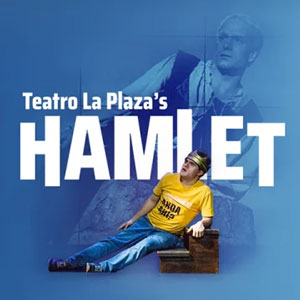

More Stories
“Tell Me On A Sunday”
“Go Dog Go! Ve Perro ¡Ve!”
Chicago Shakespeare/Teatro La Plaza presents “Hamlet” reviewed by Frank Meccia